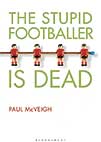 by Paul McVeigh
by Paul McVeigh
Bloomsbury, £14.99
Reviewed by Ashley Clark
From WSC 319 September 2013
Since his retirement from football in 2010, diminutive former Norwich City midfielder and Northern Ireland international Paul McVeigh has worked hard to create a brand for himself. A regular pundit on TV and radio, he also treads the speaker’s circuit and has co-founded the company ThinkPro alongside sports psychologist Gavin Drake, which trails itself on its website as an “Elite Performance Development Programme”. It’s all a long way from the days when ex-pros simply bought pubs when their playing days were done.
McVeigh’s first book – the alarmingly titled (but largely uncontroversial) The Stupid Footballer Is Dead – is constructed as a 12-step guide for professional and aspiring footballers aiming to realise their potential and develop successful careers. Based largely around McVeigh’s thesis that mental strength is gradually replacing the need for physical strength in modern football, it is clearly structured and easy to follow, as each chapter concludes with a case study and a capsule summary of its key points. However, it is sometimes repetitive and better consumed in chunks rather than one sitting.
Though one’s overall enjoyment and appreciation of The Stupid Footballer will likely hinge on their level of tolerance for the near-messianic tone and buzzword-heavy language of the self-help industry (when McVeigh glowingly mentions Paul McKenna, he’s not talking about the ex-Preston North End midfielder), much of the book’s content is undeniably salient. In chapters with titles such as “Define and follow goals”, “Create a helpful self-image”, and “Think about thinking” he offers a host of practical suggestions filtered through his own wealth of professional experience. McVeigh is not shy of the occasional critique, either – he is particularly scathing of England’s 2010 World Cup squad, who he castigates for their lack of positivity, and has some choice words regarding Joey Barton’s perceived lack of professionalism.
McVeigh comes across as likeable enough but he often lapses into cliche, while an occasional lack of self-awareness in his choice of language bleeds through. When, in the final chapter (“There is life after football”), he boasts of having “delivered stand-up comedy”, it’s impossible not to think of David Brent. Another unintentional laugh-out-loud moment arrives when McVeigh describes Pisa FC as having “failed to sign him”, rather than him “failing to secure a contract”; this kind of lacuna in logic is perhaps a corollary of the bulletproof self-confidence he’s engendered in himself through practising what his book preaches. That said, McVeigh is candid about some of his earlier career mistakes (often involving a drink or two) and offers welcome slivers of personal information about his upbringing in Belfast against the backdrop of the Troubles.
Ultimately, even though its content is hardly revolutionary, it’s not too much of a leap to say that The Stupid Footballer Is Dead, with its neatly pedagogical structure, could come to be used as a key text for coaches looking to help focus the minds of young players across the country. However, it remains to be seen whether the current generation of English footballers, who McVeigh characterises as being hooked on Xbox, will pay it much attention.